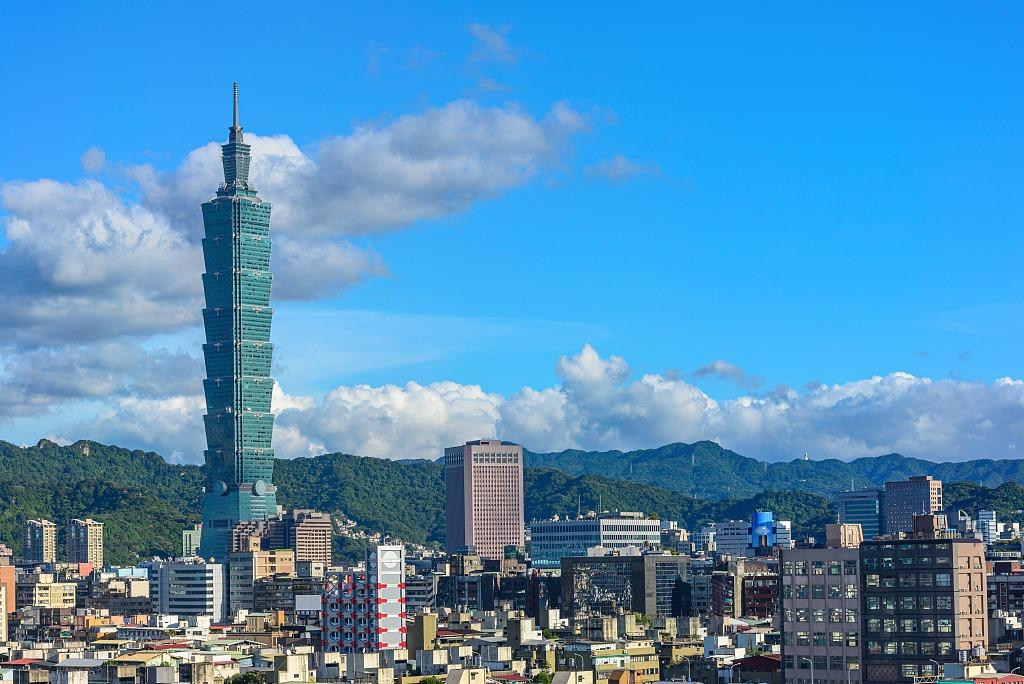 This undated file photo shows the Taipei 101 skyscraper in Taipei, Southeast China's Taiwan. (PHOTO / XINHUA)
This undated file photo shows the Taipei 101 skyscraper in Taipei, Southeast China's Taiwan. (PHOTO / XINHUA)
Although Lai Ching-te has been elected the next leader of Taiwan, his pro-independence stance will further plunge the island into the vortex of Sino-US rivalry. Muddying the political waters further is some US politicians' elusive attempt to build "collective deterrence" against a manufactured delusion of the Chinese mainland's military threat to Taiwan.
That the pro-independence movement in Taiwan poses a serious threat to the core national interests of Beijing and the Chinese people as a whole is evident to all. "Taiwan independence" is regarded by Beijing as a serious threat to the Chinese nation.
As for US allies, they should weigh the pros and cons of giving unconditional support to Washington in cross-Strait affairs
Outgoing Taiwan leader Tsai Ing-wen's refusal to acknowledge the 1992 Consensus has played a key role in the deterioration of cross-Taiwan Strait relations.
In August 2020, then US secretary of health and human services Alex Azar made a provocative trip to Taiwan to meet Tsai, making him the highest-ranking US official to visit Taiwan in 40 years. In an effort to boost Taiwan's so-called security, Tsai took steps to upgrade military training and cyber defense. Tsai also supported the anti-Beijing demonstrators in Hong Kong in the second half of 2019.
The US policy of "strategic ambiguity" has been further clouded in uncertainty. The White House has expressed a few times that Washington would come to Taiwan's aid in the event of the mainland using "force" to reunify the island with the motherland. The US Congress, too, has adopted a hostile attitude toward Beijing. Following former US House of Representatives speaker Nancy Pelosi's provocative visit to Taiwan in August 2022, Beijing-bashers in the Congress have introduced bills that have further poisoned cross-Strait relations.
Under the "Taiwan Enhanced Resilience Act" passed in 2022, Washington is committed to providing up to $2 billion annually in military aid to Taiwan between 2023 and 2027. Recently, the House of Representatives advanced three bipartisan finance bills on Taiwan, bringing legislation to bolster US support for Taiwan. The first bill supports the inclusion of Taiwan as a member of the International Monetary Fund, demonstrating that some US congressmen are still indulging in the fantasy of turning the Taiwan question into an international issue.
However, the fact is, the Taiwan question is an internal affair of China which brooks no external interference.
There is also an ineluctable risk that some US allies share its threat perception of China. Given these disturbing developments, Washington should exercise restraint in managing its disputes with Beijing over the Taiwan question and stop taking provocative actions that may result in a mutually destructive cycle of retaliation. As for US allies, they should weigh the pros and cons of giving unconditional support to Washington in cross-Strait affairs.
More important, the US allies should not look at the issue through the US' lens.
As University of Colorado professor Steve Chan has correctly pointed out, any objective composite index seeking to capture the balance of threat is not likely to support the claim that China poses a greater threat to other countries than the US.
Besides, the failure of the Democratic Progressive Party to retain a majority in the 113-seat local legislature has provided us with the necessary context without which the balance of power in the legislature in the post-election period cannot be accurately analyzed. And on Thursday, Han Kuo-yu, a former mayor and local leader candidate of Taiwan's main opposition Kuomintang party, was elected as speaker of the island's new legislature.
Undoubtedly, Taiwan residents expect the local legislature to address their livelihood issues. Partly due to the above expectations, and partly because of Taiwan's close economic ties with the mainland, the opposition parties could force Lai to adopt a more cautious cross-Strait policies and refrain from provoking Beijing.
It is highly likely that Lai will find it difficult to reduce or remove the traditional Chinese elements from the island's culture and education. And the fact that the opposition parties combined have a majority in the legislature means the legislature can order the formation of an inquiry commission to examine whether the arms procurement agreements with the US contain any unfair and/or discriminatory terms. Legislators from the opposition parties could also push for reforms to allow the island's legislators to maintain regular communication with mainland officials responsible for cross-Strait affairs.
Also, Lai would do good to promote cultural exchanges, allow mainland tourists and students to visit the island and enroll in Taiwan universities. And hopefully, he will also allow think tanks on both sides of the Strait to attend seminars together, and allow researchers to focus on the implementation of "one country, two systems" on the lines of the Hong Kong and Macao special administrative regions and promote the peaceful reunification of the Chinese nation.
Tommy Suen is director of youth development affairs of the Chinese Dream Think Tank and an administrative manager& researcher of the P&P Research Institute. Kacee Ting Wong is a barrister, part-time researcher of Shenzhen University Hong Kong and Macao Basic Law Research Center, chairman of the Chinese Dream Think Tank and a district councilor.
The views don't necessarily reflect those of China Daily


